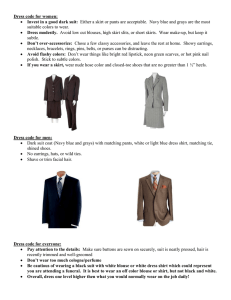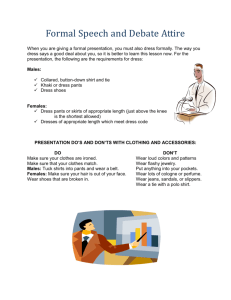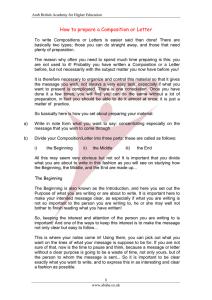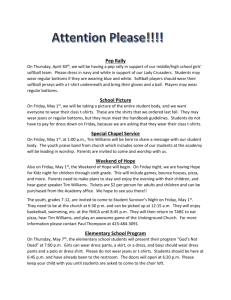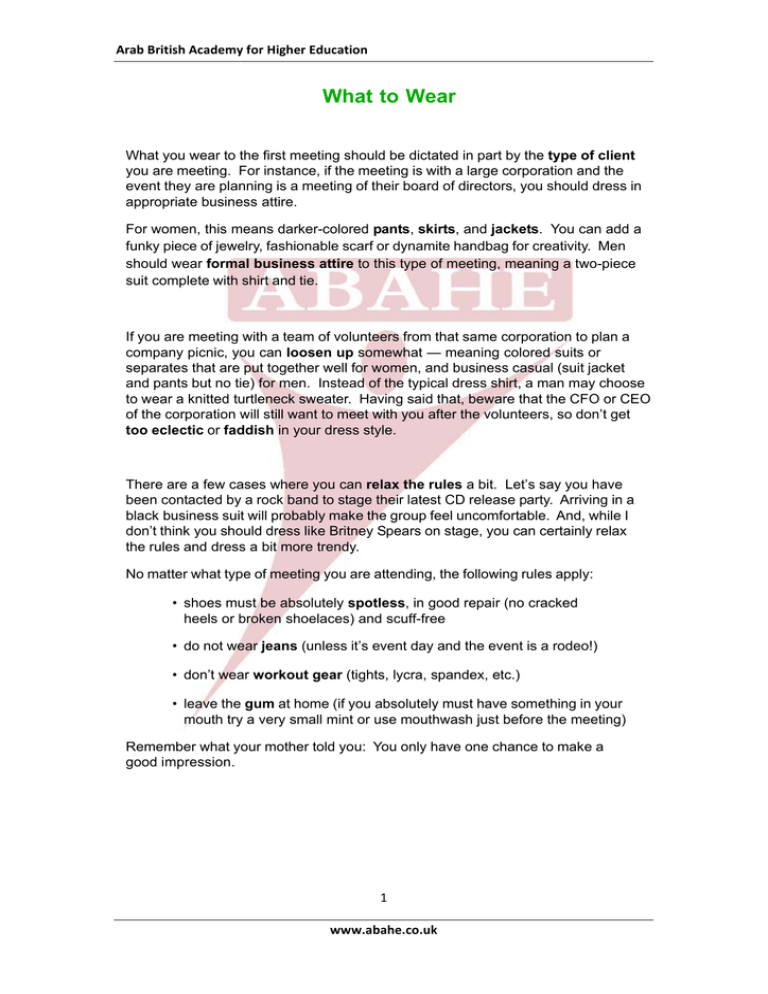
Arab British Academy for Higher Education What to Wear
What you wear to the first meeting should be dictated in part by the type of client
you are meeting. For instance, if the meeting is with a large corporation and the
event they are planning is a meeting of their board of directors, you should dress in
appropriate business attire.
For women, this means darker-colored pants, skirts, and jackets. You can add a
funky piece of jewelry, fashionable scarf or dynamite handbag for creativity. Men
should wear formal business attire to this type of meeting, meaning a two-piece
suit complete with shirt and tie.
If you are meeting with a team of volunteers from that same corporation to plan a
company picnic, you can loosen up somewhat — meaning colored suits or
separates that are put together well for women, and business casual (suit jacket
and pants but no tie) for men. Instead of the typical dress shirt, a man may choose
to wear a knitted turtleneck sweater. Having said that, beware that the CFO or CEO
of the corporation will still want to meet with you after the volunteers, so don’t get
too eclectic or faddish in your dress style.
There are a few cases where you can relax the rules a bit. Let’s say you have
been contacted by a rock band to stage their latest CD release party. Arriving in a
black business suit will probably make the group feel uncomfortable. And, while I
don’t think you should dress like Britney Spears on stage, you can certainly relax
the rules and dress a bit more trendy.
No matter what type of meeting you are attending, the following rules apply:
• shoes must be absolutely spotless, in good repair (no cracked
heels or broken shoelaces) and scuff-free
• do not wear jeans (unless it’s event day and the event is a rodeo!)
• don’t wear workout gear (tights, lycra, spandex, etc.)
• leave the gum at home (if you absolutely must have something in your
mouth try a very small mint or use mouthwash just before the meeting)
Remember what your mother told you: You only have one chance to make a
good impression.
1 www.abahe.co.uk Arab British Academy for Higher Education Developing a Client Relationship
As mentioned above, while there is no guarantee that you will get a particular
client or project, if someone has a need for your services and is meeting with
you, you have a good chance of getting their business.
Your purpose during this meeting is to turn a prospective client into a client. The
way to do this is by identifying what your client needs and wants, so you can
communicate how your services will benefit them.
This is where your interpersonal communication skills will really pay off .if this is an
area you need to improve). You can begin by giving a quick overview of your
services; however, during your meeting you should mostly ask and listen. Aim to
have your client do about 80% of the talking. (Of course, take your cue from the
client. If they prefer not to do a lot of talking, don’t try to force it.)
Instead of describing all your services, focus specifically on what the client wants,
and offer a few ideas for their event. Don’t worry about someone stealing your
ideas and then deciding not to use your services. The fact that you are willing to
share a few innovative ideas will leave the impression that you have many more
which you haven’t hared.
You should also emphasize the benefits of hiring you. By asking questions, you
will likely find that one of the following is a benefit this person would be
interested in:
• You can actually save the client money because you can negotiate
lower prices with suppliers. (This will depend on both your fees and the
relationships you have established with suppliers. However, you should
definitely let them know that – even after paying your fee – the event
will cost less than if they had organized it themselves.)
• You can save the client many hours of time. You could show them the
checklist (critical path) of all the details that have to be organized, and ask if
they have the time and energy to do all those things on top of their day-today busy schedules.
• You can find reputable suppliers and ensure there are no major event
“disasters” because you have back-up plans in place for all suppliers and
most circumstances.
• The client can enjoy a stress-free event experience.
2 www.abahe.co.uk Arab British Academy for Higher Education Remember to focus on what the client wants. Ask them why they are interested
in hiring an event planner, and what they think you can do for them. In answering
these questions, they may talk themselves into hiring you!
All Rights Reserved © Arab British Academy for Higher Education
3 www.abahe.co.uk

